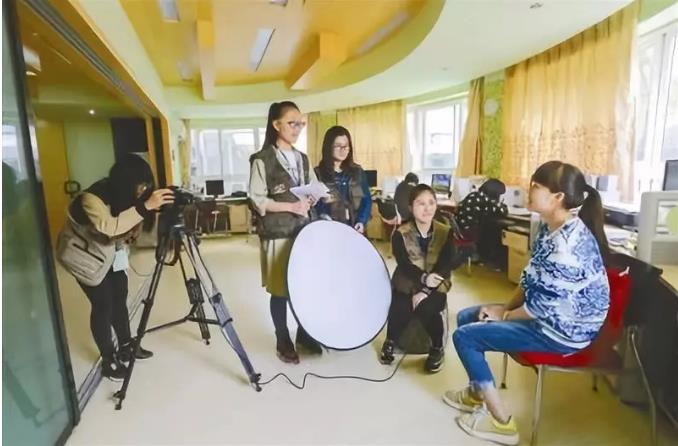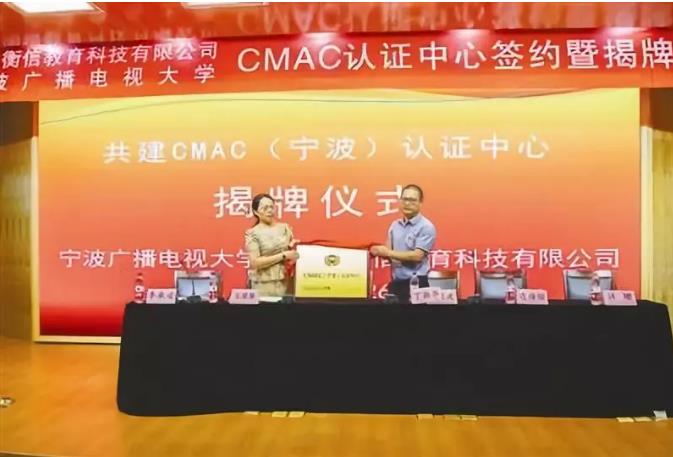 Recently, the documentary "Flakes" by Cheng Wen, a teacher at the Ningbo Radio and TV University (Ningbo RTVU), was shortlisted for the "Cultural and Natural Heritage Day: Non-Material Cultural-Heritage Film Festival", jointly sponsored by the Ministry of Culture (MOC) Centre for Ethnic and Folk Literature and Art Development and the National Library of China.
Recently, the documentary "Flakes" by Cheng Wen, a teacher at the Ningbo Radio and TV University (Ningbo RTVU), was shortlisted for the "Cultural and Natural Heritage Day: Non-Material Cultural-Heritage Film Festival", jointly sponsored by the Ministry of Culture (MOC) Centre for Ethnic and Folk Literature and Art Development and the National Library of China.
It was not the first of his documentary films to be shortlisted for an international or domestic film festival or award. Many of his students have also won awards in provincial and municipal film and television competitions. News editing and production, which Mr. Cheng teaches, is a key area of employment in Ningbo, and these achievements show only part of what has been accomplished within it.
 Students filming for the "Red Shooting Alliance" in Haishu District
Students filming for the "Red Shooting Alliance" in Haishu District
Ningbo RTVU was founded when China was beginning to undergo its reform and opening up. Over the past 39 years, it has trained more than 150,000 undergraduates and junior-college graduates, and over 1 million students altogether. Today its focus is on both academic and non-academic education in terms of open education, higher vocational education, community education, continuing education and lifelong education.
Strengthening Visual Communication
As the centre of training for a key area of employment in Ningbo City, the News Editing and Production major of the Network Communication School at Ningbo RTVU has developed a unique training model, focusing on the cultivation of news-editing skills in the omnimedia era. The major offers students comprehensive training in every aspect of this field, emphasising both practical and theoretical aspects. Both the teachers and students are committed to communicating the cultural history of Ningbo through visual media, with 145 feature films on this topic having been shot so far, gaining six awards, such as the Ningbo Radio and TV Government Award and the Ningbo Excellent Film and Television Production Award. 15 outstanding student pieces on topics such as food preparation and tailoring were broadcast on Ningbo’s "Yongpai" news platform last year. They were well received, and have helped the students in their search for employment, with some being signed directly to contracts, and others taking the initiative of starting their own businesses or finding publicity work in media companies.
In April 2018, this major continued its curriculum reforms by opening a "three-day learning + two-day internship" opportunity for sophomores. For this, the Network Communications School of Ningbo RTVU signed agreements with 12 "Yongcheng" media organisations, including "Ximending in Ningbo", "Netease Ningbo" and "Looking at Ningbo". In addition, Ningbo Publishing House, Yongpai, and Ningbo TV made offers to students. Last year, Ningbo RTVU, together with the Ningbo Network Culture Association and Sina Weibo, created the country’s first Weibo City New Media College, with a number of students going to the Sina Weibo Beijing headquarters for internships.
Cultivating Creators
The Computer Application Technology major of the Network Communications School at Ningbo RTVU has begun to focus on cultivating creativity, integrating a variety of projects and competitions to help students grow.
Dingmei Studio is where teachers and students focus on creative graphic design. Since its establishment in 2009, it has won many awards, including second and third at the 5th Ningbo University Student Web Design Competition. The students also use what they have learnt to create posters for various events. Founded in 2012, the Departure (Qicheng) computer-service team has been recognized by the Ningbo government for teaching residents to use computers, and for performing systems maintenance.
The International Economics and Trade major at Ningbo RTVU uses teaching software related to international trade, such as TMT (Technology, Media and Telecom) and SIMTRADE (Simulated Trade Teaching), as well as simulations of the import and export process, for teaching and training. It also uses educational innovations such as the flipped classroom and group teaching to enable each student to take part in the teaching process. This major has a high employment rate, and many of its students stand out in the work they take up after graduating.
Promoting Maturity
How does one determine the abilities of two people with the same certification and similar scores? The CMAC (Capability Maturity Accounting Certification) provides an answer. In June 2018, the CMAC (Ningbo) Certification Centre signing & unveiling ceremony was held at Ningbo RTVU. It is the only CMAC certification center in Ningbo.
 CMAC (Ningbo) Certification Centre Unveiling Ceremony
CMAC (Ningbo) Certification Centre Unveiling Ceremony
CMAC stands for Capability Maturity Accounting Certification. Currently, it has 15 levels, including intern, cashier, junior tax clerk, financial manager and chief financial officer. It is a widely-recognised accountant-evaluation system, and now 29 Accounting majors in the Economics and Management School at Ningbo RTVU have obtained their first-class certificates.
Of course, reform of the Accounting major goes far beyond the CMAC. Having witnessed changes in the major and increasing demand for accountants, the Economics and Management School has introduced practice-oriented curriculum reforms, and these have borne fruit, with over 33% of Accounting majors passing the difficult "National Accounting Technical Qualification Examination", for which the passing rate is usually less than 18%. In the some classes well over 50% of the students passed. To enhance practical skills, the Economics and Management School established the Shangqin Accounting Studio, which specializes in bookkeeping, offering students excellent opportunities to undertake useful work. This year the major began cooperating with a group of accounting firms, sending 42 of the best students to work for them in the middle of this month.
With their practical experience on and off campus, from simulations to real-world accounting, the students at this school are capable of adapting to work while still studying, and are qualified to work when they graduate.
University Without Walls
On the campus of Ningbo RTVU, students of all different ages can be seen, and they include full-time students during the day, continuing-education students at night, and even uniformed students from the Auxiliary Police School, which was founded in December 2017.
Through Ningbo RTVU's high-quality teaching resources and platform, this school began by improving the academic qualifications of the city’s auxiliary police forces, then looked into new forms of training for them to increase their level of professional competence.
In addition, the OUC Overseas Chinese School (Ningbo) began operations at Ningbo RTVU in October 2017. The school has a Language Learning Centre, Leisure Learning Centre for Families of Returned Overseas Chinese, and a Young Businessmen Training Centre. These were established to help Ningbo RTVU with resource integration. The school is collaborating with the Ningbo Trade Union to enable workers to attend college, and its Red Peony Institute offers training in tea art, Chinese painting, and other areas of traditional Chinese culture.
Ningbo RTVU also offers numerous lectures; it has invited distinguished professors from Qinghua, Beijing and Sun Yat-sen Universities, including Peng Lan, Yan Jirong, and Zhang Zhi'an, as well as top industrialists such as Hu Baoxiang, Xu Shiping, Qian Liming, and Dong Wenjun. They regularly come to the university to give lectures, and Ningbo RTVU alumni, such as national model worker and the May 1st Labor Medal winner Zhu Shijie, often return to lecture.
Ningbo RTVU is a "university without walls". It makes full use of the internet and modern education technology in its 10 branches to ensure that it is playing a part in society, and serving lifelong and society-wide education, by remaining open on all sides.
By Yu Sumei, Ningbo Evening News